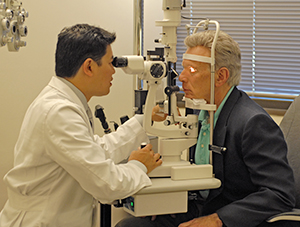Before Small-Incision Cataract Surgery
Like any operation, small-incision cataract surgery needs preparation.
Your health history
Your eye health care provider will review your health history. Based on that, they may order tests or talk to your other providers. Tell your eye care provider about any recent health conditions and all medicines you take. That includes over-the-counter medicine, such as aspirin and any vitamins or supplements. You will also be asked about your smoking history.
Your eye exam
You will have a complete eye exam. Your eye health care provider or a technician will use devices that measure the length of your eye and the curvature of the cornea. The cornea is the clear part that covers the front of your eye. These measurements let your provider select the correct new lens (IOL or intraocular lens) for you. You may also discuss your goals for what you would like to be able to see after surgery. This might be better far away vision, or better reading vision. This will help your eye care provider to choose the best lens for you.

The night before surgery
Follow any directions you are given for not eating or drinking before surgery. If you have been told to continue your daily medicine, take it only with small sips of water. Follow any other directions your health care provider gives you.
The day of surgery
Have someone drive you to and from the surgical facility. Plan to be there for about 2 to 3 hours. When you arrive, you’ll sign a consent form if you haven’t done so already. This form explains the risks of surgery. Be sure to get answers to any questions you have before signing the consent form. Just before surgery, your health care provider will give you medicine that will relax you and keep you from feeling pain. You may sleep lightly during surgery.
Risks and possible complications
-
Your health care provider may have to shift from a small incision to a larger incision.
-
There is a small chance of bleeding, infection, retinal detachment, or swelling.
Online Medical Reviewer:
Daphne Pierce-Smith RN MSN
Online Medical Reviewer:
Mahammad Juber MD
Online Medical Reviewer:
Raymond Turley Jr PA-C
Date Last Reviewed:
3/1/2025
© 2000-2025 The StayWell Company, LLC. All rights reserved. This information is not intended as a substitute for professional medical care. Always follow your healthcare professional's instructions.